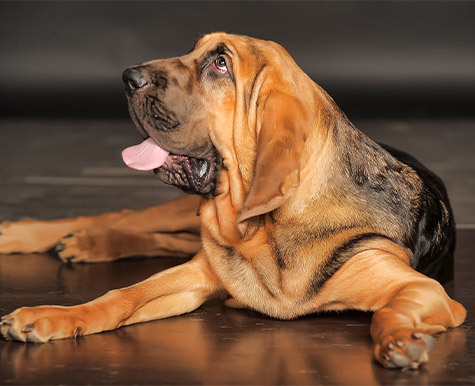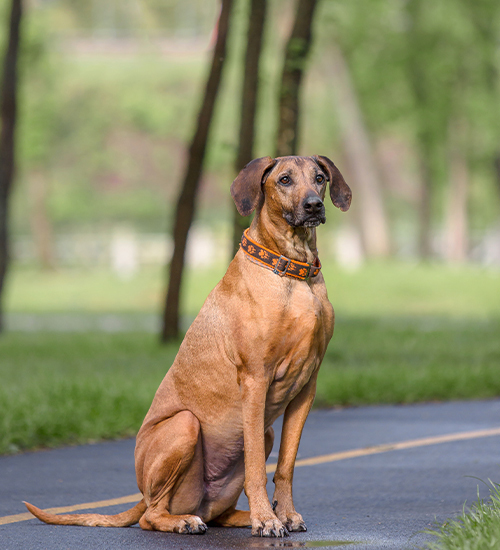






Bloodhound
 Overview
Overview
Overview of Bloodhound
As one of the most famous Bloodhounds out there, McGruff the Crime Dog can tell you that this breed has hands down the best nose in the biz. Other breeds like the Black and Tan Coonhound or Basset Hound that also have great noses can thank their Bloodhound ancestry! Although their breed origins are shrouded in mystery, Bloodhounds likely go back 2500 years. Initially the dogs of Belgian monasteries, these pooches were so meticulously bred that they came to be known as blooded hounds (hounds of aristocratic blood). Their name has more to do with having upper-class status than their ability to track a blood scent (which they can still do very well!) But for that incredible sense of smell to do its job, it isn't just the nose that does all the work. From their long velvety ears to their flappy jowls, sagging skin, and wrinkly brow, each part of their anatomy has helped amplify the Bloodhound's already impressive olfactory senses. Their floppy ears act like pendulums, sweeping scent into their sensitive nose while they track. When the Bloodhound's nose is to the ground, the skin around their eyes falls forward, creating natural blinders to keep them focused on the scent trail (sometimes for many miles at a time). These dogs can reach 130 lbs with a muscular build and come in black and tan, liver and tan, and rust. Bloodhounds excel as search and rescue dogs, often locating lost hikers, campers, children, and even lost pets.
Common Health Conditions & Recommendations for Bloodhound
Ear infection in dogs:
The Bloodhound’s adorably long droopy ears have a tendency to get into their food, water, and just about everything so they are especially susceptible to ear infections. We recommend cleaning their ears daily to help prevent a buildup of bacteria, debris, and wax that may lead to ear infections.
Recommendations for Ear infection in dogs in Bloodhound Dogs:
Common Health Conditions & Recommendations for Bloodhound
Gastric dilatation volvulus:
GDV is one of the most common health issues affecting Bloodhounds and other giant breed dogs. It can happen when they do not wait long enough between eating and playing. Air can buildup in their tummies and cause the stomach to flip, leading to a GI tract blockage. Feeding your Bloodhound smaller meals throughout the day may help prevent bloat. Keep in mind that this is a serious condition that requires immediate emergency care. The use of supplements may help improve digestion and help reduce excess gas and prevent gastric dilation to some extent, but if your dog presents bloat symptoms, they should go to the vet right away, because it is a fatal condition that can kill a dog in a matter of hours unless they have surgical intervention.
Recommendations for Gastric dilatation volvulus in Bloodhound Dogs:
Common Health Conditions & Recommendations for Bloodhound
Parasites in dogs:
Many dog breeds are susceptible to parasites and your Bloodhound is no exception! If they catch a scent, they may track for hours through tall grass and areas infested with ticks, mites, or parasitic worms.
Recommendations for Parasites in dogs in Bloodhound Dogs:
 Personality
Personality

With their adorably wrinkled skin, droopy ears, and booming bark, there is never a dull moment when you have a Bloodhound! For any neat freaks out there, this may not be the dog for you as they can tend to drool, and they can toss their slobber across the room just by shaking their head. Humans have done such a good job of cultivating the Bloodhound's sense of smell that if they catch a scent and are not in a fenced yard or on a leash, they may travel for miles on end when pursuing a scent trail. Bloodhounds are happiest when in the company of a pack, especially when the pack is other Bloodhounds! They may not be the best apartment dog, as their booming bark can be heard at great distances. A Bloodhound tends to mature at a slower rate, so patience, love and positive reinforcement go a long way!. Please pay special attention to their long velvety ears, which tend to get into everything from their food and water dish to muddy patches. We recommend washing their ears daily to help prevent ear infections. So if you want a slobbery easygoing pet who is a great addition to any family but can also track a scent like no other, you’ll love a Bloodhound!

 USD
USD
 Canadian Dollars
Canadian Dollars
